翻译Lecture 1
- 格式:ppt
- 大小:2.74 MB
- 文档页数:19
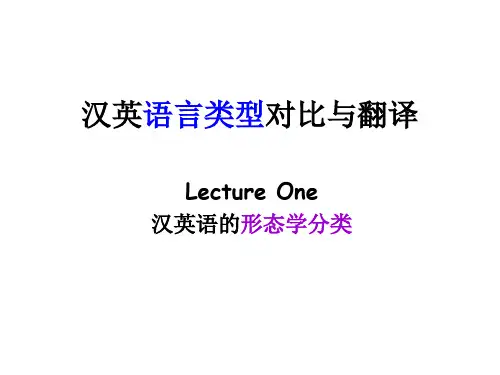
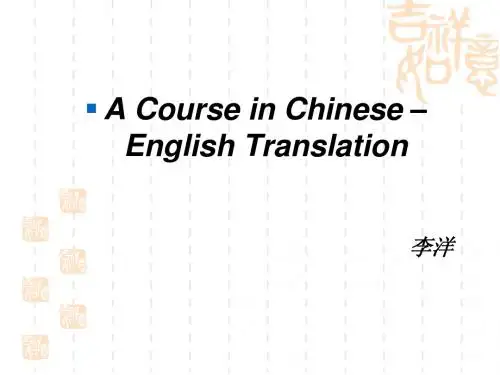
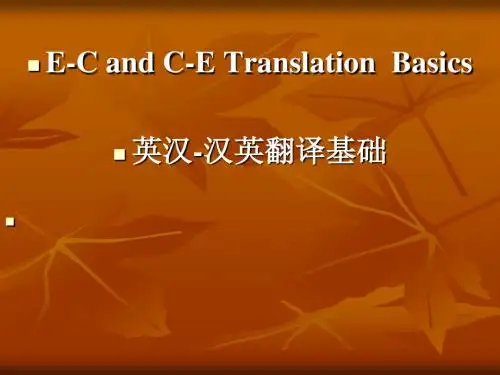
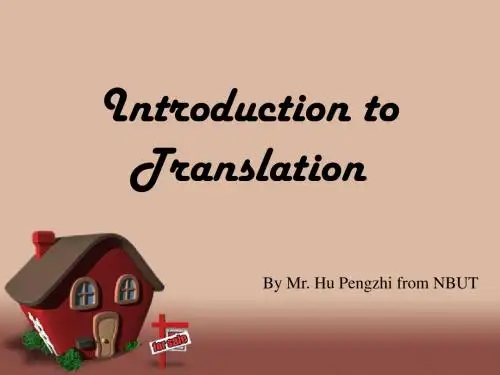

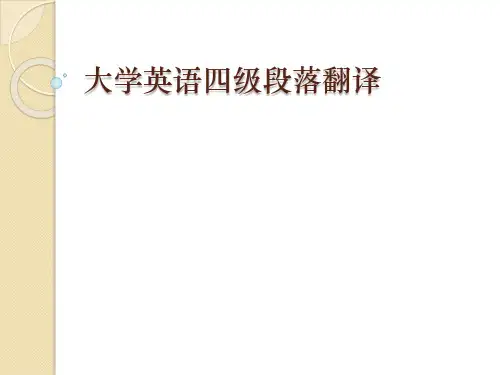
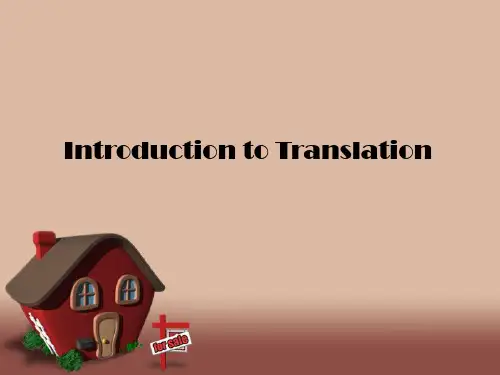
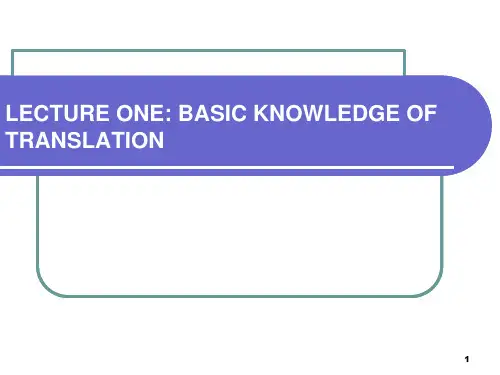
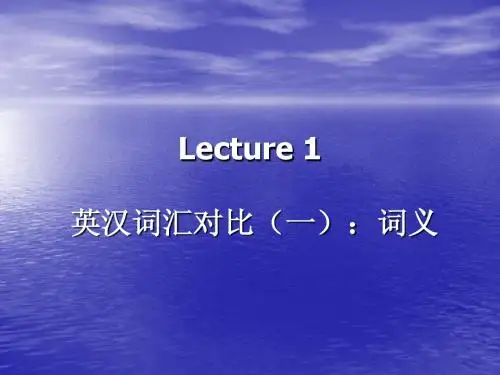
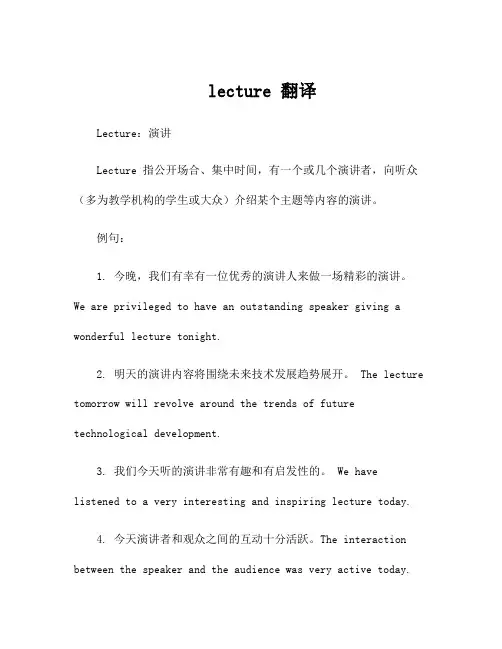
lecture 翻译Lecture:演讲Lecture 指公开场合、集中时间,有一个或几个演讲者,向听众(多为教学机构的学生或大众)介绍某个主题等内容的演讲。
例句:1. 今晚,我们有幸有一位优秀的演讲人来做一场精彩的演讲。
We are privileged to have an outstanding speaker giving a wonderful lecture tonight.2. 明天的演讲内容将围绕未来技术发展趋势展开。
The lecture tomorrow will revolve around the trends of future technological development.3. 我们今天听的演讲非常有趣和有启发性的。
We havelistened to a very interesting and inspiring lecture today.4. 今天演讲者和观众之间的互动十分活跃。
The interaction between the speaker and the audience was very active today.5. 这次演讲给我们带来了很多新的思考。
This lecture has brought us a lot of new thinking.6. 我们能够听到授课老师讲课时非常开心。
We were delighted to hear the teacher's lecture.7. 演讲带给大家很多新的想法。
The lecture brought a lot of new ideas to everyone.8. 我们应该积极主动参与演讲,发表意见和看法。
We should take an active part in lectures and express our opinions and views.9. 演讲者的精神赞扬和比喻使听众印象深刻。
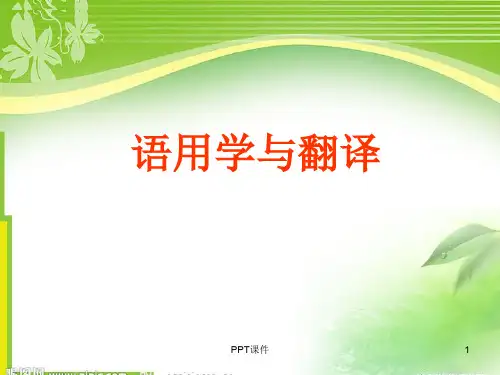
经过上文的阅读,是否意犹未尽呢?环球托福为备考托福听力的考友们带来托福TPO听力文本翻译Lecture1Astronomy(下),帮助大家复习托福听力以及分析听力文章的重点通常出现在哪些关键词后。
下面,请看环球托福分享的托福TPO听力文本:Geocentric&Heliocentric theoryFor example, Greek astronomers made excellent, very accurate observations of the movements of the planets, but the observations revealed a bit of a problem. The geocentric theory said that the planets would move around the Earth in one direction. However, astronomers noticed that at times, several planets seem to stop moving in one direction and start moving backward in their orbits around the Earth, and they came up with a theory that these planets themselves moved in smaller circles called epicycles as they travelled around the Earth. Here’s a picture of what they imagined. You see how this epicycle theory could account for the seemingly backward motion of the planet. Of course, today we know that this appearance of backward motion is caused by the fact that Earth, as well as other planets, all move in their own orbits around the Sun, and the relative movements of the planets with respect to each other can get quite complex.托福TPO听力文本翻译例如,希腊天文学家曾经对行星的运动进行过出色而准确的观测,但结果却颇为尴尬。
Electronic Teaching PortfolioBook FourUnit One: Man and NaturePart I Get StartedSection A Discussion▇Sit in groups of threes or fours and discuss the following questions.1.Do you think man lives in harmony with nature now?2.Do you think that man has been destroying nature? Could you give some examples?3.What do you think we should do to preserve nature?▇Answers for reference:1. A possible answer:No. The present relationship between man and nature is not as harmonious as before. With the population explosion and the development of the economy, serious damage has been done to nature. All this has resulted in such problems as global warming, soil erosion, shortage of fresh water, droughts and sandstorms. Human beings no longer live in harmony with nature.2. A possible answer:Yes. For example, man has cut down half of the trees that existed 10,000 years ago. The loss of trees has upset the ecosystem and resulted in the extinction of many species. Consequently, nature has lost its balance. Another example is that man has been burning too much fossil fuel for daily use and industrial production, which has caused heavy pollution to our environment.3. A possible answer:Firstly, we shouldn’t develop our economy at the expense of nature. Secondly, we should take as little as possible from nature and put back into it as much as we can. Thirdly, we should form the habit of saving natural resources. We should be aware that natural resources are not inexhaustible. When we reach the point of no return, there will be nothing left for future generations.Section B Quotes▇Study the following quotes about man and nature and discuss in pairs what you can learn from them.▇Frank Lloyd Wrigh t⊙Study nature, love nature, stay close to nature. It will never fail you.— Frank Lloyd Wrigh tInterpretation:As an architect, Wright emphasizes the importance of loving and studying nature. We should observe nature, take care of it and live in harmony with it. And then we will never feel disappointed with it.About Frank Lloyd Wright (1867-1959): an American architect and writer. He was the most creative genius of American architecture.Albert Einstein⊙Look deep into nature, and then you will understand everything better.— Albert EinsteinInterpretation:As a scientist, Einstein believes that a close study of nature will help us better understand things.About Albert Einstein (1879-1955): US physicist and mathematician, born in Germany, who developed the Theory of Relativity, which completely changed the way that scientists understand space and time.William Hazlitt⊙Look deep into nature, and then you will understand everything better.— William HazlittInterpretation:As a writer, Hazlitt urges us to love and appreciate nature heart and soul.About William Hazlitt(1778-1830):a British writer and critic, known for his essays on many subjects, especially literature. His best-known collection of essays is entitled Table Talk (《席间闲谈》).John Cage⊙The highest purpose is to have no purpose at all. This puts one in accord with nature, in her manner of operation.— John CageInterpretation:Man’s ideal life is to be integrated into nature, so we should respect nature and follow its laws.About John Cage(1912-1992): a US composer and pianist. In 1951, he organized a group of musicians and engineers to make the first music on magnetic tape.Section C Watching and DiscussionWatch the following video clip “If the world warms by 6 degrees” and do the tasks that follow:插入视频片段:“If the world warms by 6 degrees.wmv”1. Fill in the missing words according to what you hear from the video clip.If the world warms by 6 degrees, from a distance the oceans may appear bright blue, but they are marine wastelands. Deserts march across continents like conquering armies. Natural disasters become common events. Some of the world’s great cities are flooded and abandoned. If temperatures soar by 6 degrees within less than a century, we’re going to face nothing less than a global wipe out.2. What do you think are other possible consequences of a warmer climate? (Open.)Script:If the world warms by 6 degrees, from a distance the oceans may appear bright blue, but they are marine wastelands. Deserts march across continents like conquering armies. Natural disasters become common events. Some of the world’s great cities are flooded and abandoned.This could be our world plus 6 degrees.“Warmings of 6 degrees over longer time periods have been associated with some of the most devastating mass extinctions which have ever taken place, so it’s certainly fair to assume that if temperatures soar by 6 degrees within less than a century, then we’re going to face nothing less than a global wipe out.”6 degrees of warming has been called the Doomsday scenario.Our lives would never be the same again.Part II Listen and RespondSection A Word BankSection B Task One: Focusing on the Main Ideas▇Choose the best answer to complete each of the following sentences according to the information contained in the listening passage.1. What is the main idea of the passage?A) The importance of seafood supplies.B) The fish harvest in the North Atlantic.C) The decline in fish supplies in the sea.D) The importance of protecting sea resources.2. What did people in Europe and America in the 19th century think about marine resources?A) They thought that marine resources were almost exhausted.B) They thought that marine resources were seriously destroyed.C) They thought that marine resources were unlimited.D) They thought that marine resources were endangered.3. Why are the threats to fish more alarming than the threats to animals and birds?A) Because fish is a much needed food resource.B) Because plenty of fish is killed every year.C) Because fish is the only diet for many people.D) Because the sea fisheries are going to be exhausted.4. How much fish is harvested in the North Atlantic every year?A) 12 billion pounds.B) 12 million pounds.C) 20 billion pounds.D) 20 million pounds.5. What warning do scientists give in the passage?A) Natural resources will be exhausted within the next few years.B) Fish reserves will be destroyed within the next few years because of excessive fishing.C) People in some parts of the world will face starvation because of the drought.D) People’s demand on fish will decline in some parts of the world.▇Key:1 D2 C3 A4 C5 BSection C Task Two: Zooming In on the DetailsListen to the recording again and fill in each of the blanks according to what you have heard.Today though, there is evidence showing that marine resources are as seriously ________ as those of the land and the air. In fact, in some ways the ________ to fish are more alarming than the threats to animals and birds. This is because fish is a much needed food ________, as people throughout the world depend on fish as an important part of their ________. It is reported that to ________ food demands, 20 billion pounds of fish are ________ every year in the North Atlantic alone. Sea resources are also rapidly ________ in many other parts of the world.Scientists now believe that food ________ from the sea won’t last forever. They warn that ________ fishing will destroy fish reserves within the next few years. They also warn that the decline in fish supply will cause ________ in some parts of the world.▇Answers for reference:Today though, there is evidence showing that marine resources are as seriously endangered as those of the land and the air. In fact, in some ways the threats to fish are more alarming than the threats to animals and birds. This is because fish is a much needed food resource, as people throughout the world depend on fish as an important part of their diet. It is reported that to satisfy food demands, 20 billion pounds of fish are harvested every year in the North Atlantic alone. Sea resources are also rapidly declining in many other parts of the world.Scientists now believe that food supplies from the sea won’t last forever. They warn that excessive fishing will destroy fish reserves within the next few years. They also warn that the decline in fish supply will cause starvation in some parts of the world.Script:The Importance of Protecting Sea ResourcesDuring the 19th century, people in Europe and America claimed that marine resources were unlimited. For example, a noted biologist at the time commented that none of the world’s great sea fisheries were ever going to be exhausted.Today though, there is evidence showing that marine resources are as seriously endangered as those of the land and the air. In fact, in some ways the threats to fish are more alarming than the threats to animals and birds. This is because fish is a much needed food resource, as people throughout the world depend on fish as an important part of their diet. It is reported that to satisfy food demands, 20 billion pounds of fish are harvested every year in the North Atlantic alone. Sea resources are also rapidly declining in many other parts of the world.Scientists now believe that food supplies from the sea won’t last forever. They warn that excessive fishing will destroy fish reserves within the next few years. They also warn that the decline in fish supply will cause starvation in some parts of the world.Part III Read and ExploreText ASection A Discovering the Main IdeasExercise 1: Answer the following questions with the information contained in Text A.1)Does man tend to become less dependent on nature with the rapid development of society?Why or why not?2)What does the author think about the present relationship between man and nature?3)What’s the distinct feature of modern technology according to the passage?4)What’s the solution to the ecological crisis according to the author?5)What’s the author’s attitude towards the human transformation of nature?▇Answers for reference:1)No. As society develops, man tends to become less dependent on nature directly, whileindirectly his dependence grows. For instance, in this industrial society, it appears that man is relying less on nature for its natural gifts since he can produce what he needs with the help of modern technology. However, man still has to take raw materials from nature for production and, in fact, depends on nature more than ever for such irreplaceable resources as coal, oil, and so on.2)According to the author, the present relationship between man and nature is not as harmoniousas before, as the previous dynamic balance between man and nature and between nature and society as a whole has shown ominous signs of breaking down. It is increasingly difficult to obtain irreplaceable natural resources for the needs of production and to eliminate industrial waste.3)The distinct feature of modern technology is the increasing abundance of produced and usedsynthetic goods. With modern technology, man has produced and consumed more synthetic goods than he needs, which has severely polluted nature.4)According to the author, the solution lies in rational and wise organization of both productionitself and care for Mother Nature by all humanity. One of the ways to deal with the crisis is to use natural resources such as solar energy and the power of winds.5)The author takes a negative attitude towards human transformation of nature. According to thepassage, man’s transformation has brought about fatal destruction to nature. Nature is being exhausted in resources, contaminated by synthetic products, and troubled by ecological imbalance.Exercise 2: Text A can be divided into four parts with the paragraph number(s) of each part provided as follows. Write down the main idea of each part.Part Paragraph(s) Main IdeaI1-2 Man lives in the realm of nature. He is connected with natureby “blood” ties and he cannot live outside nature.II3-4 As society develops, man tends to become less dependent on nature directly, while indirectly his dependence grows because it is increasingly difficult to obtain irreplaceable natural resources for the needs of production.III5-7 At present Mother Nature is being exhausted in resources, contaminated by synthetic products, and troubled by ecological imbalance. The previous dynamic balance between man and nature and between nature and society as a whole has shown ominous signs of breaking down.IV 8-9 The solution to man-nature relation lies in rational and wise organization of both production itself and care for Mother Nature by all humanity.Section B In-depth StudyNature nurtures mankind unselfishly with its rich resources. Yet, man is so carried away in his transformation of nature that he is unaware that it also has limitations and needs constant care. Now worn by the excessive demands of mankind, nature is unable to maintain the ecological balance needed. Humanity is faced with the problem of how to stop, or at least to moderate, the destruction of Mother Nature.Man in the Realm of NatureAlexander Spirkin1 Human beings live in the realm of nature. They are constantly surrounded by it and interact with it. Man is constantly aware of the influence of nature in the form of the air he breathes, the water he drinks, and the food he eats. We are connected with nature by “blood” ties and we cannot live outside nature.2 Man is not only a dweller in nature, he also transforms it. Humanity converts nature’s wealth into the means of the cultural, historical life of society. Man has subdued and disciplined electricity and compelled it to serve the interests of society. Not only has man transferred various species of plants and animals to different climatic conditions, he has also changed the shape and climate of his environment and transformed plants and animals.3 As society develops, man tends to become less dependent on nature directly, while indirectly his dependence grows. Our distant ancestors lived in fear of nature’s destructive forces. Very often they were unable to obtain the merest daily necessities. However, despite their imperfect tools, they worked together stubbornly, collectively, and were able to attain results. Nature was also changed through interaction with man. Forests were destroyed and the area of farmland increased. Nature with its elemental forces was regarded as something hostile to man. The forest, for example, was something wild and frightening and people tried to force it to retreat. This wasall done in the name of civilisation, which meant the places where man had made his home, where the earth was cultivated, where the forest had been cut down.4 But as time goes on mankind becomes increasingly concerned with the question of where and how to obtain irreplaceable natural resources for the needs of production. Science and man’s practical transforming activities have made humanity aware of the enormous geological role played by the industrial transformation of the earth.5 At present the previous dynamic balance between man and nature and between nature and society as a whole has shown ominous signs of breaking down. The problem of the so-called replaceable resources of the biosphere has become particularly acute. It is getting more and more difficult to satisfy the needs of human beings and society even for such a substance, for example, as fresh water. The problem of eliminating industrial waste is also becoming increasingly complex.6 Modern technology is distinguished by an ever increasing abundance of produced and used synthetic goods. Hundreds of thousands of synthetic materials are being made. People increasingly cover their bodies from head to foot in nylon and other synthetic, glittering fabrics that are obviously not good for them. Young people may hardly feel this, and they pay more attention to appearance than to health. But they become more aware of this harmful influence as they grow older.7 As time goes on the synthetic output of production turns into waste, and then substances that in their original form were not very toxic are transformed in the cycle of natural processes into aggressive agents. Today both natural scientists and philosophers are asking themselves the question: Is man’s destruction of the biosphere inevitable?8 The man-nature relation — the crisis of the ecological situation — is a global problem. Its solution lies in rational and wise organization of both production itself and care for Mother Nature, not just by individuals, enterprises or countries, but by all humanity. One of the ways to deal with the crisis situation in the “man-nature” system is to use such resources as solar energy, the power of winds, the riches of the seas and oceans and other as yet unknown natural forces of the universe.9 But to return to our theme, the bitter truth is that those human actions which violate the laws of nature, the harmony of the biosphere, threaten to bring disaster and this disaster may turn out to be universal. How apt then are the words of ancient Oriental wisdom: live closer to nature, my friends, and its eternal laws will protect you!▇课文参考译文人在自然界亚历山大·斯伯金1 人类生活在大自然的王国里。
Unit1 奔向更加光明的未来1 下午好!作为校长,我非常自豪地欢迎你们来到这所大学。
你们所取得的成就是你们自己多年努力的结果,也是你们的父母和老师们多年努力的结果。
在这所大学里,我们承诺将使你们学有所成。
2 在欢迎你们到来的这一刻,我想起自己高中毕业时的情景,还有妈妈为我和爸爸拍的合影。
妈妈吩咐我们:“姿势自然点。
”“等一等,”爸爸说,“把我递给他闹钟的情景拍下来。
”在大学期间,那个闹钟每天早晨叫醒我。
至今它还放在我办公室的桌子上。
3 让我来告诉你们,一些你们未必预料得到的事情。
你们将会怀念以前的生活习惯,怀念父母曾经提醒你们要刻苦学习、取得佳绩。
你们可能因为高中生活终于结束而喜极而泣,你们的父母也可能因为终于不用再给你们洗衣服而喜极而泣!但是要记住:未来是建立在过去扎实的基础上的。
4 对你们而言,接下来的四年将会是无与伦比的一段时光。
在这里,你们拥有丰富的资源:有来自全国各地的有趣的学生,有学识渊博又充满爱心的老师,有综合性图书馆,有完备的运动设施,还有针对不同兴趣的学生社团——从文科社团到理科社团、到社区服务等等。
你们将自由地探索、学习新科目。
你们要学着习惯点灯熬油,学着结交充满魅力的人,学着去追求新的爱好。
我想鼓励你们充分利用这一特殊的经历,并用你们的干劲和热情去收获这一机会所带来的丰硕成果。
5 有这么多课程可供选择,你可能会不知所措。
你不可能选修所有的课程,但是要尽可能体验更多的课程!大学里有很多事情可做可学,每件事情都会为你提供不同视角来审视世界。
如果我只能给你们一条选课建议的话,那就是:挑战自己!不要认为你早就了解自己对什么样的领域最感兴趣。
选择一些你从未接触过的领域的课程。
这样,你不仅会变得更加博学,而且更有可能发现一个你未曾想到的、能成就你未来的爱好。
一个绝佳的例子就是时装设计师王薇薇,她最初学的是艺术史。
随着时间的推移,王薇薇把艺术史研究和对时装的热爱结合起来,并将其转化为对设计的热情,从而使她成为全球闻名的设计师。